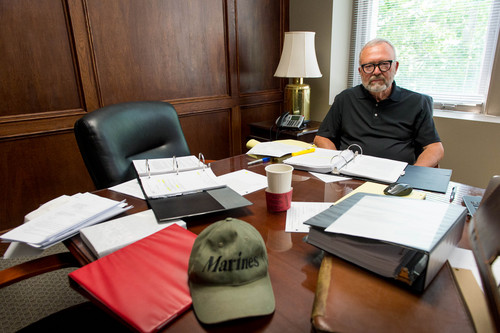This is an archived article that was published on sltrib.com in 2014, and information in the article may be outdated. It is provided only for personal research purposes and may not be reprinted.
A federal judge on Monday ordered the FBI to investigate an allegation of witness tampering in a July trial on Utah attorney Jesse Trentadue's lawsuit seeking Oklahoma City bombing records.
U.S. District Judge Clark Waddoups — who rejected arguments by an attorney for the FBI that an email from witness John Matthews declaring that he was never threatened settles the matter — scheduled a Nov. 13 hearing to hear testimony on the allegation, which he said goes to the integrity of the court process.
"I would like very much to have all this resolved," Waddoups said.
The trial focused on whether the FBI has done an adequate search for bombing records requested by Trentadue under the federal Freedom of Information Act (FOIA). On the second day of trial, Trentadue said he had just learned Matthews was backing out of testifying.
According to court documents, Matthews planned to testify that he believed the FBI was monitoring bomber Timothy McVeigh in the run up to the 1995 detonation at the Murrah Building in Oklahoma City — information that Trentadue believes the agency wants to suppress.
Trentadue, a Salt Lake City attorney, alleges that Matthews — who he describes as a former undercover operative for the government — was threatened by the FBI with the loss of his disability and other veteran benefits if he took the stand, and told that he should get a case of the "I-don't-remembers" if he did testify.
Matthews — who has said he is very ill from exposure to toxic chemicals while serving with the Marines in Vietnam — was contacted numerous times by the agency and also talked to his former "handler," who is now retired from the FBI, Trentadue says.
Both Trentadue and Roger Charles, a freelance journalist and investigator, have submitted written statements saying that when they called Matthews during the four-day trial to discuss his absence, the man said he had been threatened by the FBI.
But Department of Justice attorney Kathryn Wyer, who represents the FBI, denies any coercion.
After Waddoups directed the DOJ lawyers in July to look into the allegation, Wyer reported that Matthews had called FBI's Salt Lake City office asking how he could get out of testifying and an agent told him he should obey a valid subpoena.
On Monday, Wyer acknowledged that Matthews and Don Jarrett, his alleged former handler, were not contacted by DOJ lawyers as part of the witness tampering probe, and that no documentation of the alleged call from Matthews to the FBI was gathered.
Wyer argued that an email sent by Matthews on Aug. 2, after the trial had ended, was sufficient to show there was no tampering.
Matthews' email — addressed to Wyer, another DOJ attorney, Jarrett, Trentadue and Charles — says: "I am sending you all this, for I want the record straight. I talk (sic) with Don Jarrett (he was my handler for the FBI and now a friend) about this court case. Like we both agree, I had nothing to do with the Oklahoma City Bombing or the tapes. I did not want to testify and I did not want to get caught in a crossfire with both sides. Seeing there was no subpoena I did not have to show up. If I took a trip no one could fine (sic) me to give a subpoena to."
Jarrett told Matthews to contact the FBI in Salt Lake City to inform the agency what he was going to do, Matthews said in his email message. It was his understanding, he wrote, that the agent who answered the phone was supposed to inform the court he was not going to testify.
Matthews also wrote, "NO ONE FROM THE FBI OR DOJ HAS MADE ANY THREATS TO ME OR MY FAMILY."
Trentadue pointed out that Matthews had agreed to testify voluntarily and there was no subpoena. And he said Matthews had told Charles the day before he was to testify that the FBI had told him "to stand down," which he believes influenced his decision against taking the stand.
Trentadue filed suit in 2008 seeking bombing records from the FBI and CIA, which since has been dropped as a defendant. He believes the records will provide information about his brother's death in a federal prison in Oklahoma City a few months after the April 19, 1995, bombing that killed 168 people.
The death of Kenneth Trentadue was ruled a suicide, but his family believes he was mistaken for a bombing conspirator and killed in an interrogation that got out of hand. Federal officials deny the allegation.
Waddoups has taken the FOIA trial case under consideration and will issue a ruling later.
Trentadue is asking for an order allowing him to search for tapes and documents at FBI locations, including field offices in Oklahoma City and Los Angeles, and requiring the bureau to produce the records he requested, including a videotape of the detonation. The FBI says it spent weeks searching its massive bombing investigation archive and that it has no tape of the explosion or the other requested materials that Trentadue claims are being withheld.
Twitter: @PamelaMansonSLC



